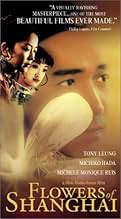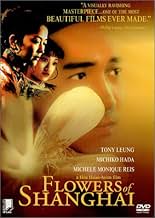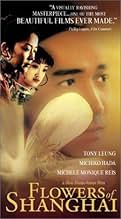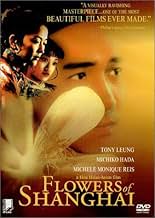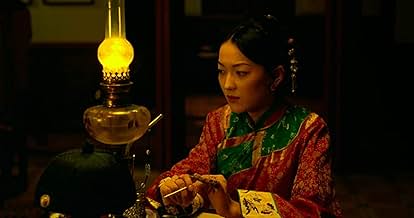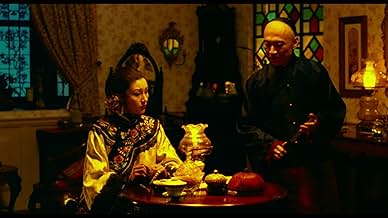CALIFICACIÓN DE IMDb
7.3/10
4.4 k
TU CALIFICACIÓN
Agrega una trama en tu idiomaIn the "flower houses" (upscale brothels) of Shanghai, various interweaving stories of love, loyalty, and deceit play out subtly.In the "flower houses" (upscale brothels) of Shanghai, various interweaving stories of love, loyalty, and deceit play out subtly.In the "flower houses" (upscale brothels) of Shanghai, various interweaving stories of love, loyalty, and deceit play out subtly.
- Dirección
- Guionistas
- Elenco
- Premios
- 6 premios ganados y 6 nominaciones en total
Tony Leung Chiu-wai
- Wang Lingsheng
- (as Tony Chiu Wai Leung)
Michelle Reis
- Emerald
- (as Michelle Monique Reis)
Carina Lau
- Pearl
- (as Carina Lau Ka-ling)
Rebecca Pan
- Huang
- (as Rebecca Pan Wan-ching)
Tony Chang
- Peking Opera Actor
- (as Tony Chang Ruei-che)
Yiu-Ming Lee
- Azhu
- (as Yu-ming Lee)
- Dirección
- Guionistas
- Todo el elenco y el equipo
- Producción, taquilla y más en IMDbPro
Opiniones destacadas
"Flowers of Shanhai" is a stunningly beautiful film, elegantly visualized and intriguingly scripted. It explores not only the conflicts between individuals, but also issues of gender and class, and the way in which the people in power find their lives eroding under the influence of opium, foreign currency, and the buying and selling of sexual favors and social influence. The intricate connections between older and younger businessmen, older and younger courtesans, masters, mistresses, and servants, and people of differing degrees of wealth and influence, are all examined as prostitutes try to buy their freedom, or find reasons for staying in the brothels even when someone wants to buy their freedom for them, and as both men and women fix themselves on paths to self-destruction.
Calling it too slow paced for a modern audience rather misses the point. Certainly there aren't many car chases or gunfights in it, and if one defines pace only in terms of physical action, it might be fair to call it slow. For audiences with an attention span of longer than 60 seconds and an interest in psychological action rather than physical action, it moves right along. In fact, I found myself having to rewind and view several scenes again because they developed too fast for me to follow as I took in the subtitles. I was very pleased at its lack of Hollywoodism. It's the kind of film "Age of Innocence" might have been if "Age of Innocence" had relied more on acting and less on posing in its cultivation of emotional intensity. In "Flowers of Shanhai," melodramatic action is depicted as a weakness displayed by characters, rather than being exploited as a way of sustaining the audience's interest in a character-based story in which the director has no confidence.
Calling it too slow paced for a modern audience rather misses the point. Certainly there aren't many car chases or gunfights in it, and if one defines pace only in terms of physical action, it might be fair to call it slow. For audiences with an attention span of longer than 60 seconds and an interest in psychological action rather than physical action, it moves right along. In fact, I found myself having to rewind and view several scenes again because they developed too fast for me to follow as I took in the subtitles. I was very pleased at its lack of Hollywoodism. It's the kind of film "Age of Innocence" might have been if "Age of Innocence" had relied more on acting and less on posing in its cultivation of emotional intensity. In "Flowers of Shanhai," melodramatic action is depicted as a weakness displayed by characters, rather than being exploited as a way of sustaining the audience's interest in a character-based story in which the director has no confidence.
The Taiwanese writer-director Hou Hsiao-hsien is regarded by many as the greatest living filmmaker, and FLOWERS OF SHANGHAI is widely considered one of the strongest contemporary movies. Hou's approach is both anthropological and highly formalized: this examination of the economics and Machiavellian power politics of a Shanghai brothel in the mid-1800's stays remote. The feeling is sometimes that of a news crew eager not to intrude, but the mise-en-scene evokes the mastery of space-carving in Kurosawa's HIGH AND LOW or Bresson's UNE FEMME DOUCE. Shot in wide, mobile masters that go on for four or five minutes at a stretch, FLOWERS is theatrical in the extreme, and, as in a Yuan drama or a Kun opera, Hou stays at a more than respectful reserve from his characters. For some, this spells high-art elegance; others may feel starved for vividness and human immediacy, and wish the film to end far sooner than it does.
This is a film for patient and serious film-lovers. From the first scene, one face takes almost complete possession of the screen - that of Tony Leung. There he is, a silent member of a group of drinking men, and just try to take your eyes off him. Throughout the entire film, he dominates, but that is exactly right for this tale of obsessive love in a 'house of flowers'. A totally fascinating film.
This movie was absolutely brilliant.
It was filmed in a manner that makes it seem more realistic than most movies. Each frame is beautiful.
A note on dialect - This movie (with the exception of Leung to his mistress) is in Wu Chinese. Wu is hardly a minor language, spoken by well over 70 million people worldwide. It is spoken not only in Shanghai (the largest city in China) but the surrounding provinces, including such large cities as Suzhou and Wenzhou. It is actually more widely spoken than Cantonese and Taiwanese combined, making it the second-most-spoken variety of Chinese, dwarfed only by Mandarin. (70 million speakers is a lot of people; many national languages in Europe have fewer speakers) However, Wu is not spoken by as many overseas Chinese as are Cantonese, Mandarin, and Hokkien (aka Taiwanese, Minnan, etc), and for that reason less Westerners speak it. (in addition, Cantonese, Hokkien, and Mandarin are all the primary languages of at least one self-ruling political unit, even though the former two have less speakers than Wu)
This is the only well-known movie with dialogue primarily in Wu, and it is based on the 19th century Wu novel by the same name (except read as Wu).
It was filmed in a manner that makes it seem more realistic than most movies. Each frame is beautiful.
A note on dialect - This movie (with the exception of Leung to his mistress) is in Wu Chinese. Wu is hardly a minor language, spoken by well over 70 million people worldwide. It is spoken not only in Shanghai (the largest city in China) but the surrounding provinces, including such large cities as Suzhou and Wenzhou. It is actually more widely spoken than Cantonese and Taiwanese combined, making it the second-most-spoken variety of Chinese, dwarfed only by Mandarin. (70 million speakers is a lot of people; many national languages in Europe have fewer speakers) However, Wu is not spoken by as many overseas Chinese as are Cantonese, Mandarin, and Hokkien (aka Taiwanese, Minnan, etc), and for that reason less Westerners speak it. (in addition, Cantonese, Hokkien, and Mandarin are all the primary languages of at least one self-ruling political unit, even though the former two have less speakers than Wu)
This is the only well-known movie with dialogue primarily in Wu, and it is based on the 19th century Wu novel by the same name (except read as Wu).
I saw this film at Cannes where delegates, including would-be intelligent critics emerged from the film scratching their heads and mumbling 'interesting' - a sure sign that they couldn't understand a word of it. For me it had been an epiphanous experience.
Six months later Cahiers du Cinema voted it the best film of its year...
I am sure there is a word to describe the effect of the film, but I can't lay my hand on it, so I will say 'emotionally disjoint'. As the men sit around playing Mah Jong talking, generally of trivia, huge emotional dramas are going on, but obliquely, in relation to the girls in the brothel. The effect is crushing.
I thought, while watching, mainly of Jean-Marie Straub as it has a minimalist side, but with such greater emotional power and resonance. It is so tragic that this magnificent film has had such a poor release in the west - no theatrical distribution at all in the UK...
Six months later Cahiers du Cinema voted it the best film of its year...
I am sure there is a word to describe the effect of the film, but I can't lay my hand on it, so I will say 'emotionally disjoint'. As the men sit around playing Mah Jong talking, generally of trivia, huge emotional dramas are going on, but obliquely, in relation to the girls in the brothel. The effect is crushing.
I thought, while watching, mainly of Jean-Marie Straub as it has a minimalist side, but with such greater emotional power and resonance. It is so tragic that this magnificent film has had such a poor release in the west - no theatrical distribution at all in the UK...
¿Sabías que…?
- TriviaThe film consists of 38 long shots.
- ConexionesFeatured in Hai shang chuan qi (2010)
Selecciones populares
Inicia sesión para calificar y agrega a la lista de videos para obtener recomendaciones personalizadas
- How long is Flowers of Shanghai?Con tecnología de Alexa
Detalles
Contribuir a esta página
Sugiere una edición o agrega el contenido que falta


